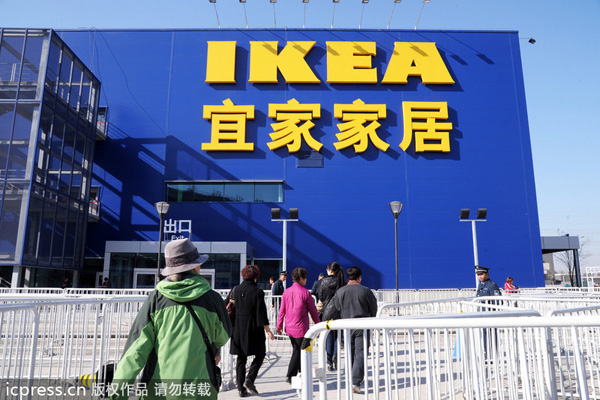Quality watchdogs must stay alert
Updated: 2016-07-15 07:30
(China Daily)
|
||||||||
 |
| Customers come to visit Ikea's new store in Beijing, Nov 4, 2013. [Photo/icpress.cn] |
After having a "meeting and talk" with the General Administration of Quality Supervision, Inspection and Quarantine, IKEA is recalling 1.66 million chests of drawers sold on the Chinese mainland between 1999 and this year.
The Swedish furniture retailer had already recalled this type of chest of drawers in North America because it said there was a risk they might be dangerous to children. The US Consumer Product Safety Commission found the Malm drawers could topple over and crush children if they were not anchored to walls.
IKEA's reversal of its position in China is not based on its own decision-making, but is a passive response to the strong dissatisfaction from consumers and pressure from Shanghai's quality watchdog, the Shenzhen Consumers' Association, and particularly from the country's top quality watchdog.
However, IKEA's previous refusal to recall these problematic products on the mainland should not be viewed as the company intentionally ignoring the interests of Chinese consumers. As the company previously stated, there have not been any cases of the chests of drawers causing injury in China and the quality of the products it sells in the country conforms to the national safety standards.
The company recalled the chests of drawers in North America because the product did not meet industry standards in the United States. This raises the question of whether our national quality standards are too low.
Out of cost-saving considerations, no enterprise is motivated to recall sold products if it does not face enough pressure to do so. IKEA's " recall " demonstrates that the relevant State departments should not remain indifferent or absent when it comes to protecting consumers ' legitimate rights and interests. At the same time, they should also try to improve national institutions on product quality and leave no institutional loopholes that may be exploited by producers.--Beijing Times
- China calls on US, Japan to stop twisting the facts
- Girl suffers sibling rivalry disorder after younger brother's birth
- Two Nansha islands greet their first civil flights
- Chinese people saving earlier for retirement, survey says
- Students turn scrap parts into animal statues
- China has approved its first sound trademark

 Picture Chinese stories: 10 illustration books you can't miss
Picture Chinese stories: 10 illustration books you can't miss
 Theresa May: New Iron Lady in Downing Street
Theresa May: New Iron Lady in Downing Street
 Large amount of sea grass besieges Qingdao
Large amount of sea grass besieges Qingdao
 Monks seek tranquility inside lotus ponds
Monks seek tranquility inside lotus ponds
 In pics: Top 10 livable Chinese cities
In pics: Top 10 livable Chinese cities
 Restaurant of 'bandits' opens in Northeast China's Jilin
Restaurant of 'bandits' opens in Northeast China's Jilin
 Ivanovic, Schweinsteiger holds wedding in Venice
Ivanovic, Schweinsteiger holds wedding in Venice
 Tim Duncan announces retirement after 19 seasons with Spurs
Tim Duncan announces retirement after 19 seasons with Spurs
Most Viewed
Editor's Picks

|

|

|

|

|

|
Today's Top News
Ministry slams US-Korean THAAD deployment
Two police officers shot at protest in Dallas
Abe's blame game reveals his policies failing to get results
Ending wildlife trafficking must be policy priority in Asia
Effects of supply-side reform take time to be seen
Chinese State Councilor Yang Jiechi to meet Kerry
Chinese stocks surge on back of MSCI rumors
Liang avoids jail in shooting death
US Weekly

|

|







